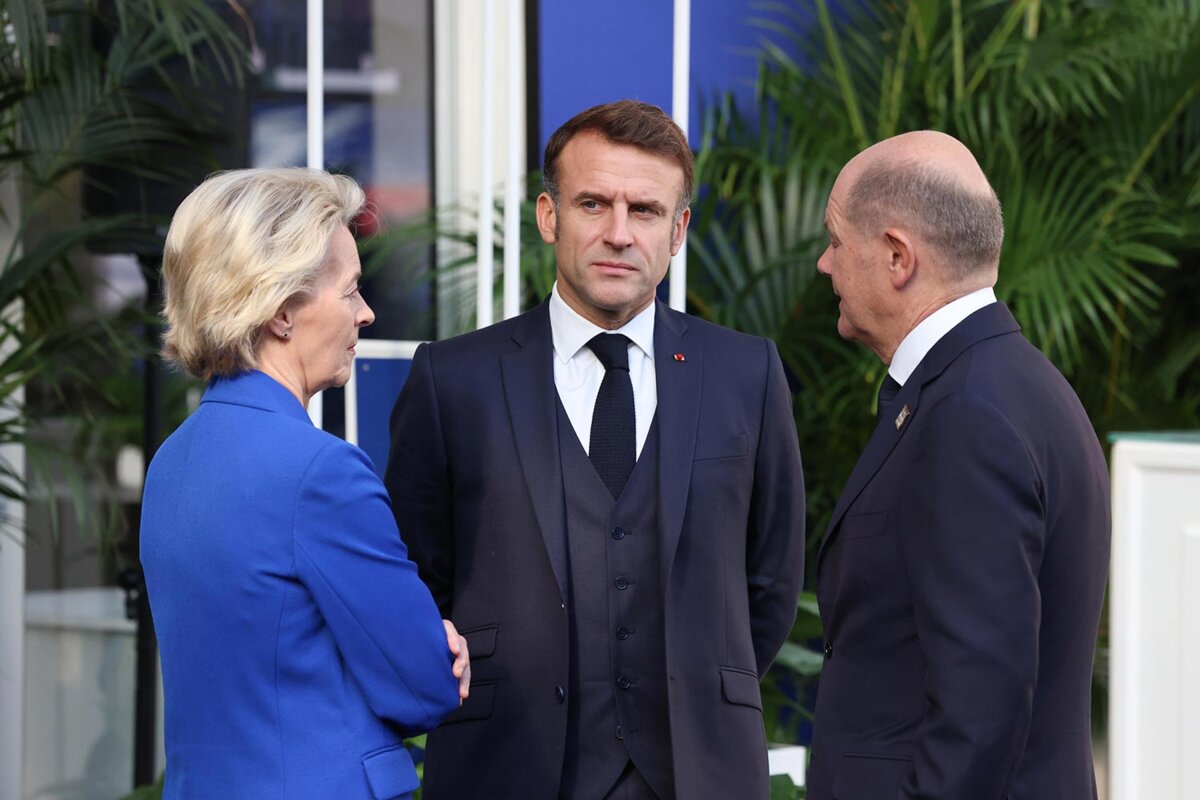The fall of Michel Barnier’s government on Wednesday night comes at a perilous moment for Europe, as the European Union (EU) seeks to devise a strategy in response to Donald Trump’s return to office in January, forcing it to rethink its trade policy and adjust its military support for Ukraine.
The vote toppling the French executive, the first of its kind since 1962, comes only weeks after Germany announced early elections for February, weakening Chancellor Olaf Scholz’s voice in Brussels. This means that during the initial weeks of the new Trump presidency, the EU will have to deal with a Franco-German partnership that is missing in action.
“[Marine] Le Pen's far-right and the far-left prefer to jump into the void, taking the fate of France and the French people with them. This is irresponsible behaviour,” Manfred Weber, the Bavarian leader of the European People’s Party (EPP) group, the largest in the European Parliament, said on Wednesday evening after French MPs from the far-right and the Left voted down the Barnier government.
To make matters worse, political crises in the two largest economies of the Eurozone coincide exactly with the start of Ursula von der Leyen’s new Commission, as well as the arrival of Portuguese social-democrat Antonio Costa as President of the European Council on December 1st. These moments of political transition are challenging at the best of times.

Enlargement : Illustration 1

On December 3rd Ursula von der Leyen’s new spokesperson, Paula Pinho, stated: “We are never pleased when a government falls, leading to the uncertainty that follows, in a situation like this, which also has wider implications in the economic context.”
Paris losing influence
During the 2010s the EU institutions in Brussels grew accustomed to the frequent changes of government in Italy, culminating in Giorgia Meloni's victory in 2022, and in the United Kingdom during the Brexit negotiations from 2016. But until recently France’s presidential system had been seen as a guarantee of stability. Since this summer’s unexpected dissolution of the National Assembly that perception has changed.
“Macron will attempt to present himself as a pillar of stability. But he seems increasingly buffeted by events, rather than in control of them - just when Europe most needs strong and concerted leadership in its major capitals, ” the Financial Times wrote on Tuesday, reflecting concerns widely shared across the EU.
“...[W]ithout leadership from France and Germany, nothing ambitious can happen in Brussels,” declared British weekly magazine The Economist on Thursday, alarmed by what it described as France’s step into “deep trouble”. Paris’s waning influence in Brussels, not a new phenomenon but something that is worsening with each successive crisis, carries the risk of assisting those who advocate more regular alliances between right-wing and far-right forces in the Belgian capital.
Italian prime minister Giorgia Meloni and Hungarian prime minister Viktor Orbán have every reason to feel triumphant. As if to underscore this, Meloni hosted Orbán in Rome on December 4th – the Hungarian leader’s second visit to Italy in just six months.
The French budget and Mercosur
In the short term, the European Commission is closely monitoring the various scenarios surrounding France’s budget for next year, after Paris was sanctioned last summer for an “excessive deficit” by the Brussels executive. France eventually submitted its plans late, on October 31st, committing itself to reducing its public deficit to 5 per cent by 2025, following attempts in the Barnier budget to save 60 billion euros through a mixture of reduced spending and higher taxes. French authorities are currently forecasting a deficit of 6.1 per cent for this year.
The European Commission approved this approach on November 26th. However, the collapse of the Barnier government changes the entire equation. The crucial – though by no means certain – assumption that there will be a special law enabling the extension of the 2024 budget into 2025, with potentially minor amendments, would significantly alter the content of France’s so-called “PSMT”, the country's “national medium-term fiscal structural plan” that is submitted to the Commission.
According to a study by financial institution Natixis, rolling over the 2024 budget for another year would still allow France to reduce its deficit to 5.3 per cent. However, other forecasts are less “optimistic”, suggesting a deficit remaining above 6 per cent.
This will be a cause for concern among advocates of the “stability pact” in Brussels, who are closely monitoring public finances in member states to avoid a renewed sovereign debt crisis in the Eurozone. Automatically extending the 2024 budget would also cancel the planned increase in military spending included in Michel Barnier’s ill-fated 2025 budget, something seen as critical in Brussels as it comes to terms with the idea of supporting Ukraine without the United States.
The collapse of the French government also coincides with a trip by Ursula von der Leyen to the Uruguayan capital Montevideo, where a summit of Mercosur countries (Argentina, Brazil, Bolivia, Paraguay, Uruguay) is being held on December 5th and 6th.
The President of the Commission's decision to attend signals an imminent announcement regarding the conclusion of technical negotiations on the EU-Mercosur free trade agreement.
However, the political equation remains fraught for von der Leyen, especially as Poland's prime minister Donald Tusk has joined France in opposing the treaty. Madrid and Berlin, meanwhile, are pushing for a swift agreement.
Emmanuel Macron believes he forged an alliance in November against the treaty with Argentina's libertarian president, Javier Milei, who opposes the text for reasons opposite to those of Paris – arguing it remains overly regulatory. But Brazil’s President Lula, a supporter of the treaty, hopes to overcome Argentina’s objections. Whatever the outcome this week, it would mark only the start of a long and highly uncertain ratification process on the European side.
-----------------------------------------------------------------------------
- The original French version of this article can be found here.
English version by Michael Streeter


